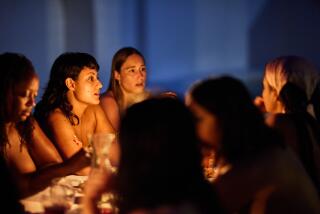The Bitter Taste of ‘The Dinner Party’
- Share via
In his Oct. 12 article, “The Battle of Chicago,” Richard Mahler shuns journalistic balance and objectivity in favor of a transparent apologia of Judy Chicago and her work. Had Mahler spoken with anyone opposed to this initiative, he would have learned:
* That while many administrators at the University of the District of Columbia found nothing at all objectionable about “The Dinner Party’s” artistic focus, they were deeply troubled with the Chicago-UDC agreement.
Under this agreement, “The Dinner Party” was not a free gift to the university. UDC trustees entered into a simple-use agreement that imposed obligations on the university while providing the artist and others with certain benefits. The university was required to assume all costs and risks arising from the display of the work but did not gain title.
In addition, both Chicago and her not-for-profit corporation, Through the Flower Inc., were to receive a significant percentage of any proceeds resulting from the university’s display of the work or sale of reproductions. This aspect of the agreement was characterized by some museum officials as “unusual.”
* That some administrators and leading Washington preservationists were deeply concerned over the potential impact of proposed renovations on the university’s landmark Carnegie Library. Much of the building’s glorious marble interior would have been sacrificed, and the building’s marble exterior would have been seriously compromised in order to enlarge the main doors, which are simply too small to allow entrance of the work.
* That, if one is to believe Chicago’s own statement, she decided to withdraw from the agreement in deference to the wishes of the 300 protesting students who had closed down the campus.
Chicago made no mention of the “religious fanatics” and neo-Nazi conspiracy she now appears to credit in the Mahler story with frustrating her efforts to place “The Dinner Party” at UDC. Is Chicago now suggesting that the UDC students were dupes of some right-wing conspiracy?
* That some students and faculty at the historically black university also questioned the appropriateness of housing a controversial artwork that depicts significant women of the imperialistic “Western civilization.” These students and faculty, supported by the community, have demanded that the university instead focus on the trans-African experience, on people, history and art of this great non-Western culture.
* That the cost to the taxpayers of Washington in housing “The Dinner Party” would have been at least $3 million. It is true that renovation costs for the Carnegie would not have come from the operating appropriation of the university, but these funds would have come from the sale of public bonds. Retirement of $1.6 million in bonds would have eventually cost the taxpayers of Washington nearly $3 million. Further, it is true that bond funds cannot be diverted to academic programs and services, as some students requested.
But these funds could have been spent on instructional facilities. The trustees could have renovated funds to UDC’s Van Ness Library, which currently attempts to serve 12,000 students with fewer than 300 seats, or to improve the laboratories of its engineering or life sciences programs.
* That Chicago and members of Through the Flower Inc., had been seeking a site to display “The Dinner Party” in order to eliminate its substantial warehousing costs. Had Mahler inquired, he might have learned of this intention through a January, 1990, Los Angeles Times article reporting on a California gala held to raise funds to pay for “The Dinner Party’s” storage and insurance costs following the work’s return from Australia.
Mahler’s description of the controversy in highly polarized language is unfortunate. Mahler has effectively tarred all opponents of the UDC-Chicago agreement with a single brush while obscuring the self-interested motivations of certain principals.
Even more seriously, Mahler has linked this controversy to the national debate over artistic freedom. The struggle convulsing UDC, and of which this controversy is a minor chapter, is simply unrelated to the larger, national debate.
This conflict has been--and will continue to be--a struggle over priorities. The choice is whether Washington’s one public institution of higher learning will put aside its historic disputes and focus its energies in service to a city in crisis or will it continue to dissipate these energies on ventures of marginal relevance to the city and its students.
The final resolution of the UDC-Chicago agreement did not constitute a defeat of Chicago or feminist values by neo-Nazis or religious fanatics. What we have witnessed is a long-overdue upheaval by a group of deeply committed students who demand nothing less than a university dedicated to their education and Washington’s revitalization.
More to Read
The biggest entertainment stories
Get our big stories about Hollywood, film, television, music, arts, culture and more right in your inbox as soon as they publish.
You may occasionally receive promotional content from the Los Angeles Times.








